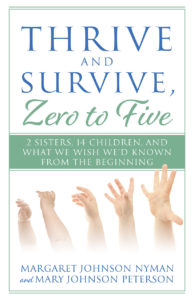Excerpt from THRIVE AND SURVIVE, ZERO TO FIVE
I (Mary) used to volunteer for the local Meals on Wheels organization, packing and taking healthy meals to shut-ins. Though I’d wanted to do this from the time my children were little, I decided it would be too much to bring them along. Instead I waited till they were all in school. I could deliver the meals quicker that way and move on to the many other things I wanted to do.
Then one day, after collecting the packaged meals I was to deliver and shoving the overloaded bin into my car, I watched as another mom joined our crew of delivery ladies. She’d brought her two-and-four-year-olds along and was moving at their much slower pace. She handed one meal at a time to her little ones. “Carry this to Mommy’s car now. Be careful, because there’s a hungry lady waiting for us to bring it to her.”
The example of this woman patiently letting her children help with this worthwhile project impacted me, and I stopped to watch. It occurred to me I’d missed a golden opportunity to teach my children some great lessons by waiting to volunteer till they were all in school. Meals on Wheels would have been the perfect way to teach an important character trait: helping those who couldn’t help in return. And since most of the meal recipients were elderly, they would have been blessed to see the children. But I’d chosen to put efficiency above values, forfeiting that opportunity.
When you and your young children do things together, God counts this as “redeemed time.” Including the youngsters He’s given you elevates the activity to a level of His special blessing since you are joining with Him in acknowledging their importance. Children are little for only a short time, and those first five years fly by. So work to be deliberate about beating the clock, making that time count.
SIDEBAR: A PEEK INTO YOUR PRESCHOOLER’S HEART

